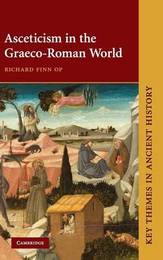
|
Asceticism in the Graeco-Roman World
Hardback
Main Details
| Title |
Asceticism in the Graeco-Roman World
|
| Authors and Contributors |
By (author) Richard Finn
|
| Series | Key Themes in Ancient History |
|---|
| Physical Properties |
| Format:Hardback | | Pages:196 | | Dimensions(mm): Height 234,Width 156 |
|
| Category/Genre | European history
Religion - general
History of religion |
|---|
| ISBN/Barcode |
9780521862813
|
| Classifications | Dewey:938 |
|---|
| Audience | | Tertiary Education (US: College) | | Professional & Vocational | |
|---|
|
Publishing Details |
| Publisher |
Cambridge University Press
|
| Imprint |
Cambridge University Press
|
| Publication Date |
2 July 2009 |
| Publication Country |
United Kingdom
|
Description
Asceticism deploys abstention, self-control, and self-denial, to order oneself or a community in relation to the divine. Both its practices and the cultural ideals they expressed were important to pagans, Jews, Christians of different kinds, and Manichees. Richard Finn presents for the first time a combined study of the major ascetic traditions, which have been previously misunderstood by being studied separately. He examines how people abstained from food, drink, sexual relations, sleep, and wealth; what they meant by their behaviour; and how they influenced others in the Graeco-Roman world. Against this background, the book charts the rise of monasticism in Egypt, Asia Minor, Syria, and North Africa, assessing the crucial role played by the third-century exegete, Origen, and asks why monasticism developed so variously in different regions.
Author Biography
Richard Finn OP is a Dominican friar and currently Regent of Blackfriars Hall at Oxford University, where he is a member of the Theology faculty and of the Classics faculty. He most recently published Almsgiving in the Later Roman Empire in 2006.
Reviews'... an invaluable introductory work ... Finn successfully presents the multitude of practices and beliefs composing the larger ascetic traditions of the Greco-Roman world that Christian asceticism was constructed with and at times constructed against.' The Expository Times
|